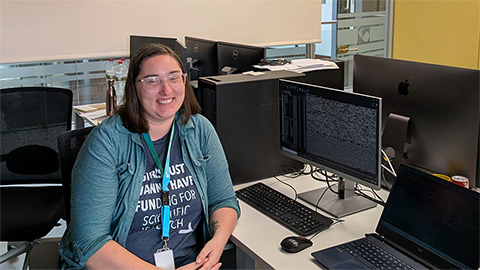JBC editors weigh in on AI in science publishing
Earlier this week, the Journal of Biological Chemistry published an editorial to define appropriate and inappropriate uses of artificial intelligence technology in the “preparation and review of manuscripts being considered for publication.”
The editorial states that AI technology:
-
Can be used to prepare manuscript text to improve clarity
-
Cannot be listed as an author on a manuscript
-
Cannot be used in any part of the review process


Roger Colbran, a professor of molecular physiology and biophysics at Vanderbilt University School of Medicine and an associate editor of the JBC, authored the editorial with Editor-in-Chief Alex Toker of Beth Israel Deaconess Medical Center and Harvard Medical School.
“The rapid development and continued evolution of AI-based tools makes it hard to get a handle on their limitations in real-life use,” Colbran said. “These uncertainties make it important for the publishing industry, including the JBC, to define clear policies surrounding the acceptable and unacceptable uses of current AI-based technologies, with a clear understanding that they will need to be regularly updated as the technologies are further developed.”
The editorial acknowledges the potential benefits that AI technology may provide to non-native English speakers preparing manuscripts for submission, stating that the JBC will “welcome authors to make use of generative AI technologies in editing the text of their manuscript, in much the same way that authors may make use of more traditional editing services.” If AI is used for the editing of a manuscript, it must be included in the acknowledgements section of the manuscript, the editorial says.
“AI-driven tools have the potential to significantly reduce the amount of time and effort that scientists must dedicate to writing essentially any documents, be they research articles, reviews, book chapters, grants, or manuscript/grant critiques,” Colbran said. “There are also benefits in allowing scientists to rapidly learn about new areas of science. This could drive an increase in the overall efficiency of the entire research enterprise by allowing researchers to dedicate more time to doing actual science.”
Finally, the editorial states that AI may not be used for manuscript review, such as during the writing of manuscript critiques or decision letters. It points to the possibility that using AI may violate data privacy rights and cites published concerns about the confidentiality. Uploading a manuscript to a public AI tool may allow “retained conversations to be accessed by their AI trainers to improve future performance,” it says.
“There are significant concerns about the confidentiality of any information that is provided to these systems,” Colbran said. “Additional generative AI tools are being rapidly developed to ‘create’ raw image data, potentially including gels, blots and micrographs. Such synthesized data may be very hard to detect using the image analysis pipelines currently used by journals and publishers.”
Enjoy reading ASBMB Today?
Become a member to receive the print edition four times a year and the digital edition monthly.
Learn moreGet the latest from ASBMB Today
Enter your email address, and we’ll send you a weekly email with recent articles, interviews and more.
Latest in Opinions
Opinions highlights or most popular articles

Women’s health cannot leave rare diseases behind
A physician living with lymphangioleiomyomatosis and a basic scientist explain why patient-driven, trial-ready research is essential to turning momentum into meaningful progress.

Making my spicy brain work for me
Researcher Reid Blanchett reflects on her journey navigating mental health struggles through graduate school. She found a new path in bioinformatics, proving that science can be flexible, forgiving and full of second chances.

The tortoise wins: How slowing down saved my Ph.D.
Graduate student Amy Bounds reflects on how slowing down in the lab not only improved her relationship with work but also made her a more productive scientist.

How pediatric cataracts shaped my scientific journey
Undergraduate student Grace Jones shares how she transformed her childhood cataract diagnosis into a scientific purpose. She explores how biochemistry can bring a clearer vision to others, and how personal history can shape discovery.

Debugging my code and teaching with ChatGPT
AI tools like ChatGPT have changed the way an assistant professor teaches and does research. But, he asserts that real growth still comes from struggle, and educators must help students use AI wisely — as scaffolds, not shortcuts.

AI in the lab: The power of smarter questions
An assistant professor discusses AI's evolution from a buzzword to a trusted research partner. It helps streamline reviews, troubleshoot code, save time and spark ideas, but its success relies on combining AI with expertise and critical thinking.

